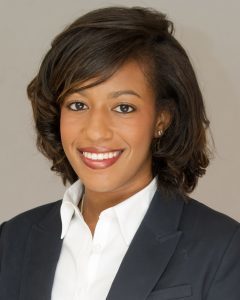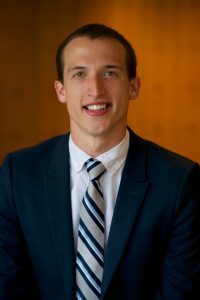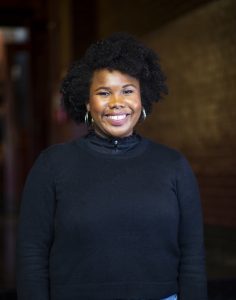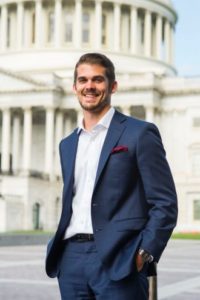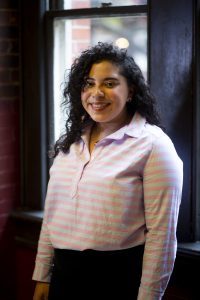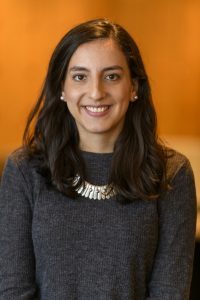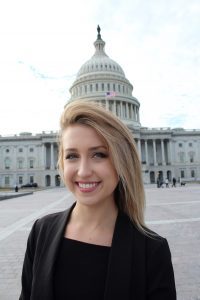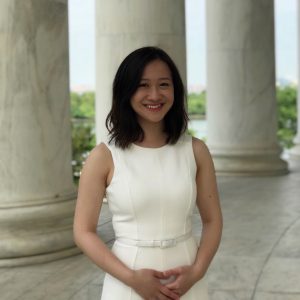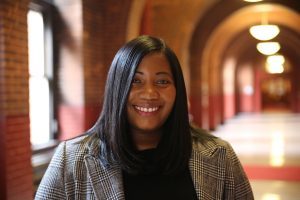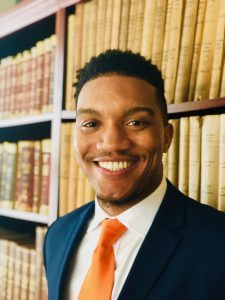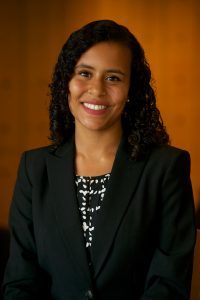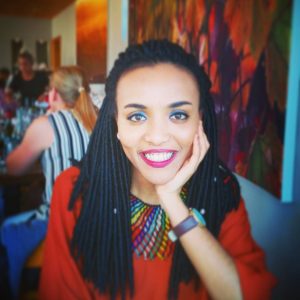Pickering Fellows
The Thomas R. Pickering Foreign Affairs Fellowship Program is a program funded by the U.S. Department of State, administered by Howard University, that attracts and prepares outstanding young people for Foreign Service careers in the U.S. Department of State. Based on the fundamental principle that diversity is a strength in our diplomatic efforts, the program values varied backgrounds, including ethnic, racial, social, and geographic diversity. Upon successful completion of a two-year master’s degree program, fellows agree to a minimum five-year service commitment in the Department of State’s Foreign Service, serving in Washington, DC and at a U.S. embassy, consulate, or diplomatic mission around the globe. Learn more about the Pickering Fellowship here.
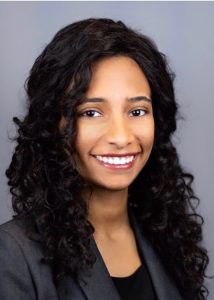
Anastasia Burnett (MSFS’20)
Durham, North Carolina
Georgetown University (Major: History)
Why did you choose Georgetown for preparation for the Foreign Service?
I had attended Georgetown as an undergraduate student and I knew from my time on the Hilltop that I would receive a quality education at Georgetown surrounded by students and professors who were all committed to service in the international community. I especially loved our motto of living as Hoyas for other and the community I had when I graduated in 2015. When I decided I wanted to return to graduate school, Georgetown was at the top of my list.
What has been your favorite part of your Georgetown experience so far?
My favorite Georgetown experience has probably been attending the Nicaragua in Crisis event this Fall. I was able to hear directly from Ariannna Moraga, a student activist, about her work and experiences on the front lines in Nicaragua after a brutal crackdown by her president. Her powerful testimony was heartbreaking and invigorating. She reminded me that my age is not a limit and my generation can be a force to reckoned with.
What hopes do you have for the future of the Foreign Service?
I hope the Foreign Service continues its efforts to embrace the diversity of the United States in its workforce. Programs like the Pickering and Rangel fellowships have shown me truly how powerful our government can be when we leverage our many voices and experiences.
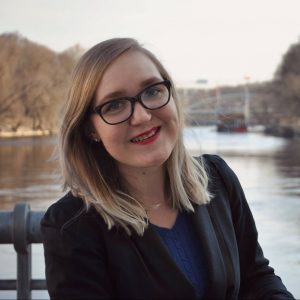
Alina Clay (MSFS’20)
Memphis, Tennessee
University of Tennessee, Knoxville (Major: Comparative Politics, Policy, and Gender)
Why did you choose Georgetown for preparation for the Foreign Service?
The exceptional amount of knowledge and career experience that professors offer in the classroom and to their students drew me to MSFS. I was also in awe of the incredible quality of students the program attracts every year. Students at MSFS will no doubt be future world leaders yet happen to also be your colleagues, and it’s an incredible privilege and honor to work alongside them and build friendships during this two-year program.
What has been your favorite part of your Georgetown experience so far?
Georgetown does such a wonderful job of offering a range of both professional or academic experiences outside of the classroom and social activities to bond with your classmates. I’ve thoroughly enjoyed attending events like The 5th Annual Consulting Day and A Conversation with Secretary John Kerry, as well as social affairs like the MSFS Winter Ball. You get such a great mixture here at Georgetown, and there’s never not a number of equally great events to attend during any day of the year.
In which region would you be most excited about working?
Each region of the world offers such a diverse array of people, traditions, languages, histories, and more, and a Foreign Service Officer gets to experience this beauty first-hand. I’ve enjoyed some truly memorable educational and professional experiences across Latin America, Asia, and Europe, but I’m excited and ready to work in any region in which my country will need me the most.
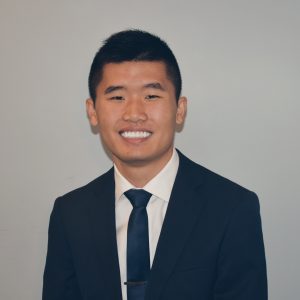
Eric Chu (GHD’20)
St. Paul, Minnesota/Hsinchu, Taiwan
University of Minnesota (Major: Plant Biology)
What inspired you to join the Foreign Service?
I want to combine my background in science, interests in international development and diplomacy, and passion for learning and using languages into a career. My experience serving as a Peace Corps Volunteer in Uganda affirms my commitment to public service. As a new American, I also want to help show the diversity of the U.S. to the world.
Why did you choose Georgetown for preparation for the Foreign Service?
I chose Georgetown’s Global Human Development (GHD) program because it has the right balance of multidisciplinary curriculum, practical experiences, and cohort size for me. On top of that, the School of Foreign Service provides the opportunity for graduate students to take language courses. The combination of GHD courses, internship requirements, and language training would make me a more effective Foreign Service Officer.
What do you see as the greatest diplomatic challenges going forward?
Reaching an international consensus to mitigate the effects of climate change.
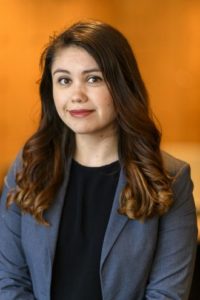
Marichuy Gomez (MSFS’19)
Los Angeles, California
Smith College (Majors: Government and History)
What inspired you to join the Foreign Service?
During my Fulbright fellowship orientation in Turkey, I became inspired to join the Foreign Service as I heard a Foreign Service Officer (FSO) share her experiences. In particular, I was motivated to serve and represent my country overseas, while having the opportunity to shape policy and work with people from different countries.
Why did you choose Georgetown for preparation for the Foreign Service?
The MSFS program had everything I was looking for in a graduate program: a comprehensive academic curriculum, Turkish language courses, and a great community of students and professors.
What has been your favorite part of your Georgetown experience so far?
My classmates. They are a group of accomplished and hardworking individuals that inspire me to be better every day.
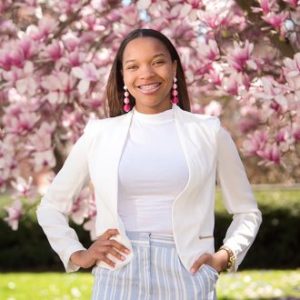
Ashley Jones-Quaidoo (SSP’20)
Prince George’s County, Maryland
Bucknell University (Major: International Relations)
What inspired you to join the Foreign Service?
As a child, my grandmother would sit me in front of the television to watch Fox 5 news. During that time, we entered the War in Iraq. I can recall images from the news of our service men and women; those images stuck with me as I admired their bravery, commitment, and service. It was my love for news and service that inspired me to join the Foreign Service. Therefore, I began to search for opportunities that would allow me to fulfil my purpose, and the Thomas R. Pickering Foreign Affairs Fellowship has given me the chance to develop as Foreign Service Officer. I will have the opportunity to serve my country and use my voice to tell stories directly from the countries in which I serve.
What has been your favorite part of your Georgetown experience so far?
Georgetown offers so many events outside of the classroom. While I enjoy my classes and the diversity of each, it is equally important for me to explore outside of the classroom. I have listened to former Secretary of State John Kerry, attended programs relating to the Middle East, and have had coffee chats about foreign policy. I can appreciate these experiences, as they will make me better and challenge me to understand differing perspectives.
In which region would you be most excited about working?
My research has primarily focused on Africa and the Middle East, so I would appreciate an opportunity to serve in those regions. However, as a future Foreign Service Officer, I am committed to serving my country, so I am able and willing to serve anywhere in the world. Wherever I am assigned, I will work with the same vigor and zeal.
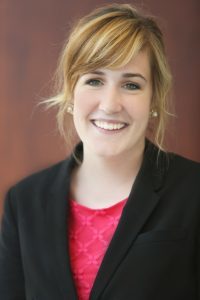
Caroline Lanford (MSFS’20)
Jackson, Mississippi
Tulane University (Majors: Political Science and French)
What has been your favorite part of your Georgetown experience so far?
The discussions I’ve had with professors and fellow students have been really rewarding, and the MSFS program‘s focus on practical skills will help me perfect my ability to write concisely, research efficiently, and present confidently, all of which will be essential to my success as a Foreign Service Office.
In which region would you be most excited about working?
One of the joys of being a U.S. Foreign Service Officer is the wide range of places you could be stationed. I’m grateful for the flexibility of the MSFS program in that it allows me to be a generalist, and, so far, my plan is to learn as much about as many parts of the world as I can. My foreign language of fluency is French, but I’m taking advantage of the undergraduate language scholarship to take classes in Spanish in hopes of becoming fluent in that language as well.
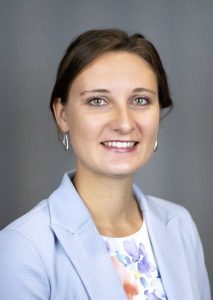
Sophia Meulenberg (MSFS’20)
Sandpoint, Idaho
Westmont College (Major: Political Science Concentration: International Affairs Minor: French)
What inspired you to join the Foreign Service?
I have wanted to join the Foreign Service ever since I found out as a young kid that being a U.S. diplomat overseas was a real job! I’ve always loved international politics, traveling, and learning about new cultures, so I am thrilled at the chance to join the State Department as a FSO. I deeply cherish the ideals of democracy, freedom, prosperity, and security that the United States promotes around the world and I am honored to serve my country.
Why did you choose Georgetown for preparation for the Foreign Service?
I chose Georgetown because of its premier reputation and incredible faculty. Since its founding in 1919, the School of Foreign Service has developed world leaders committed to international service at the highest level. The faculty at Georgetown come from diverse backgrounds in public policy, government, think tanks, international organizations/institutions, and the private sector–providing a wealth of experience that each professor draws on in the classroom. But even more significantly, the professors enthusiastically invest in their students! I am very happy that I chose Georgetown and I know that I will leave here well-prepared to contribute to the crucial work of the State Department.
What has been your favorite part of your Georgetown experience so far?
My favorite part of my Georgetown experience so far has been my interactions with fellow students. My peers in the MSFS program continue to amaze me with their passion, insight, and dedication to making the world more just and peaceful. Whether during guided conversations in class, spontaneous debates in the MSFS lounge, or energetic discussions during a happy hour, I can always count on SFSers to thoughtfully engage tough questions, provide much-needed support, and teach me something new. Plus we have a lot of fun!
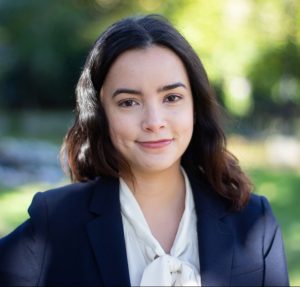
Stephanie Myers-Irizarry (MAERES’19)
Trujillo Alto, Puerto Rico
University of Puerto Rico in Rio Piedras (Majors: Political Science and Economics)
What inspired you to join the Foreign Service?
I have always been committed to representing my country and its values abroad. During my time as a Boren Scholar in Moscow, Russia, I had the opportunity to speak with Foreign Service Officers about their careers. I was struck by how, regardless of their different career tracks and countries where they previously served, they were equally dedicated to representing America through diplomacy. Through these conversations, I realized the importance of skillful and agile diplomacy, and have since sought to participate in these endeavors.
In which region would you be most excited about working?
I would love to work in Central Asia. I am interested in energy trade and environmental policy, and this region presents many related unique challenges and opportunities.
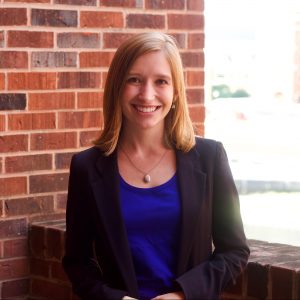
Kate Shafer (MSFS’20)
Atlanta, Georgia and Port Jefferson, New York
Elon University (Major: International Studies)
What inspired you to join the Foreign Service?
When I was abroad in Costa Rica during college, my class took a trip to the U.S. Embassy in San José. It was there that I first learned about the Foreign Service. I was instantly fascinated and inspired to apply to an internship at the U.S. Mission to the United Nations in Rome, Italy. That internship solidified my commitment to a Foreign Service career; for the first time in my life, I had a job that I loved so much that I was sad to not be able to work on the weekends. Following college, I taught English in China and Taiwan. I loved participating in strengthening international understanding and championing U.S. values while abroad. Now, as a Thomas R. Pickering Fellow, I am ecstatic about the opportunity to continue to do so as a Foreign Service Officer.
Why did you choose Georgetown for preparation for the Foreign Service?
Georgetown has one of the strongest international relations graduate programs in the world. At Georgetown I have the opportunity to study under top scholars, learn from experienced practitioners, attend daily workshops and events to supplement my classes, and develop a lasting network in D.C. MSFS in particular emphasizes topics that are crucial to Foreign Service work: national security, global politics, international development, ethics, human rights, and leadership.
What concerns and hopes do you have for the future of the Foreign Service?
I strongly believe in the mission of the Foreign Service and am committed to doing my part as it continues to evolve and adapt to the needs of our country and global affairs. I am encouraged by the existence of programs such as Pickering, as they demonstrate the Foreign Service and the Department of State’s commitment to serving as a true representation of the United States of America. I believe in the resilience of the Foreign Service, as well as its ability to continue to find new and innovative ways to promote diversity and inclusivity, champion American values abroad, serve American citizens, and further U.S. foreign policy. It is for all of these reasons and more that I am honored and excited to be a part of the Foreign Service’s future as an FSO.

Maggie Samuels (MAERES’20)
Searsmont, Maine
Hampshire College (Majors: Turkish Studies and Computer Science)
What inspired you to join the Foreign Service?
I wanted to take my experiences as the daughter of a fisherman in rural Maine and show the world that U.S. diplomats can come from any background and help model just how diverse our country is.
Why did you choose Georgetown for preparation for the Foreign Service?
I wanted to keep studying the Turkic World and Georgetown is one of the only universities in the United States that has a robust program in that area.
In which region would you be most excited about working?
I think the Foreign Service’s focus on world wide availability is really exciting, because you are always headed where you are most needed and learning something new. However, I would like to serve in Central Asia if I had the chance.

